Spend some time in Middle-earth and you’ll learn a lot of secrets. I shadowed the cast and creators of the much-anticipated Lord of the Rings prequel series, The Rings of Power, for four days at San Diego Comic-Con in July. During my conversations with the showrunners, executive producer, and several members of the cast, I did my best to pick up clues about where the series may be headed—along with details about the immense production behind the epic saga.
The Rings of Power, which debuts Sept. 2 on Prime Video, is already the most expensive show ever created. The showrunners, J.D. Payne and Patrick McKay, have planned 50 hours of television, broken up over five seasons, and the story is sprawling. They pulled from Tolkien’s appendices, notes the author left at the end of The Return of the King about the events of the Second Age, thousands of years before heroes like Aragorn or Frodo were born.
If you want to watch the series without knowing anything about what might happen in the show, know that this story contains minor spoilers. Stop reading now. But if you want some background on the series and how Payne and McKay cooked up a story from Tolkien’s notes, forge ahead. I’ve seen two episodes of the show, and the information in this story comes primarily from the appendices.
The Second Age is a time of (relative) peace for Middle-earth. The first dark lord, Morgoth, has been vanquished, and his servant Sauron is missing. The High King Gil-galad (Benjamin Walker) rules over the elves in Lindon. Prince Durin IV (Owain Arthur) and his father, King Durin III (Peter Mullan), command the dwarves in Khazad-dûm. Queen Regent Míriel (Cynthia Addai-Robinson) presides over the island kingdom of Númenor.
But not everything is as serene as it appears. Anyone who was watched Peter Jackson’s The Fellowship of the Ring movie may have noted the ruins of Númenor and Khazad-dûm and divined that those two realms meet bitter ends. Míriel’s rule will be challenged by Pharazôn (Trystan Gravelle), and the dwarves will eventually awake an evil creature, the Balrog.
To purchase prints of TIME’s The Rings of Power cover, visit the TIME Cover Store
There are also more immediate threats. A young Galadriel (Morfydd Clark) is convinced that Sauron survived the war and is amassing power. Meanwhile, another elf warrior named Arondir (Ismael Cruz Córdova) and the human he’s romancing, Bronwyn (Nazanin Boniadi), encounter orcs. And nomadic harfoots, ancestors of the hobbits, named Nori (Markella Kavenagh) and Poppy (Megan Richards) find a mysterious stranger (Daniel Weyman) who was fallen from the sky in a flaming meteor. It’s unclear if this man is good or evil. But bizarre occurrences generally don’t portend well for Middle-earth.
We know that eventually Sauron will rise to power and forge the titular rings: Three for the elves, seven for the dwarves, nine for mortal men. He will also secretly make one ring to rule them all. The elves and men will have to form an alliance to battle the new dark lord, and though they will defeat him, they will fail to destroy the one ring, thus precipitating the events of The Lord of the Rings.
Read More: The Rings of Power Exclusive: Producer Says Fan Theories About Sauron Are Wrong
The Rings of Power audience will meet other characters either featured or name dropped throughout The Lord of the Rings, including the powerful half-elven Elrond (Robert Aramayo); the elf-smith Celebrimbor (Charles Edwards), whom Sauron tricks into teaching him secrets of how to make the rings; Isildur (Maxim Baldry), Aragorn’s ancestor and the man who cannot bring himself to throw the one ring into Mount Doom; and Elendil (Lloyd Owen), Isildur’s father, who, with Gil-galad, forms the alliance between elves and men to stop Sauron.
Here are just a few of the surprising facts I learned about the plot and creation of the series during my time with the cast and creators.
The creators pitched the show as a five-season version of the five-minute prologue in Jackson’s The Fellowship of the Ring
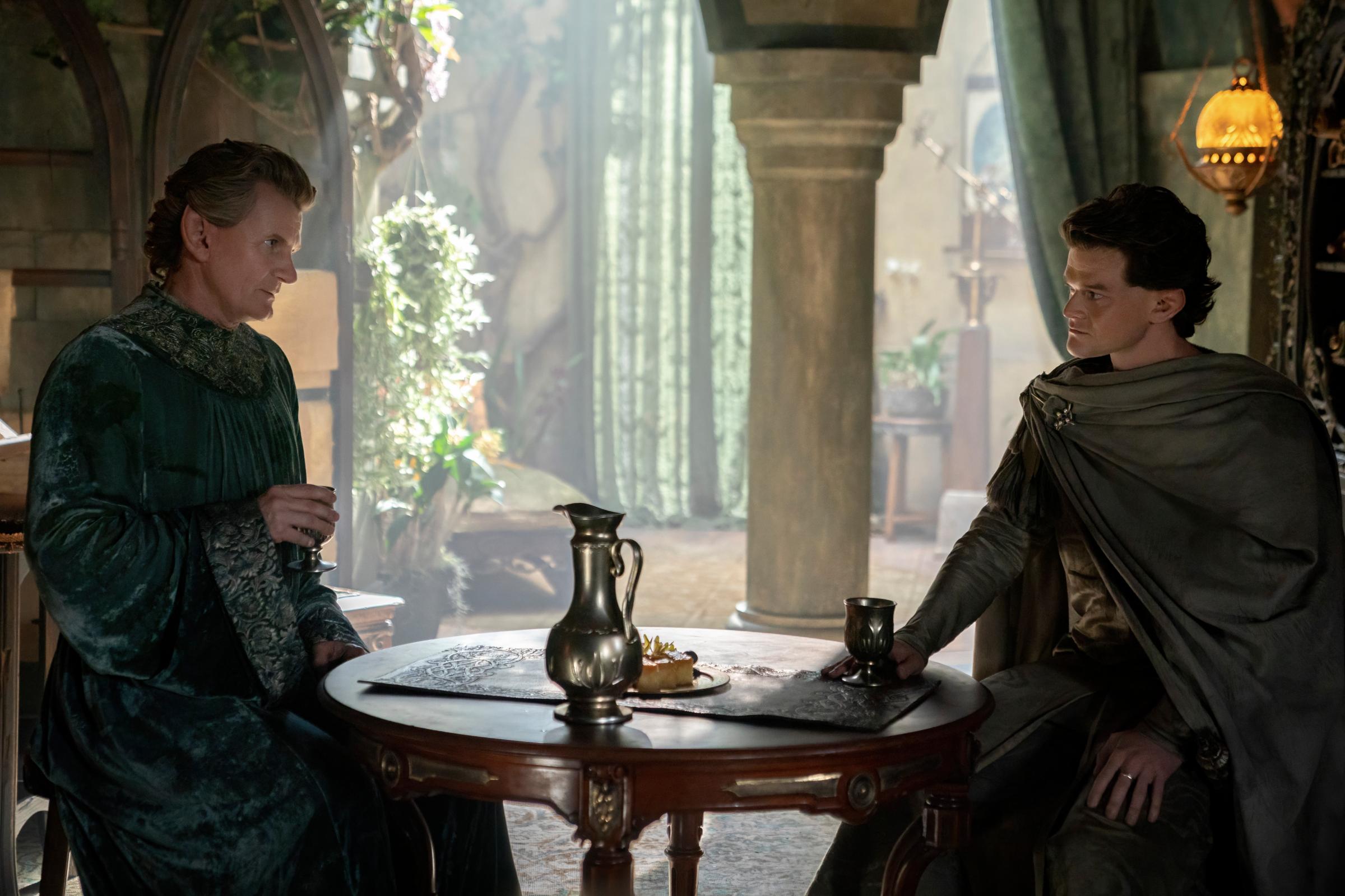
McKay described how he and Payne pitched the studio executives who weren’t necessarily die-hard Tolkien fans on their idea for a series based in Middle-earth’s Second Age.
“The way we boiled it down was, ‘Remember the first five minutes of the Peter Jackson movies when Galadriel says: The rings were made, three for the elven kings, seven for the dwarf lords, nine for mortal men. But they were all deceived. Sauron rose to power and almost took over the world. We all had to band together to fight him.’ That five minute prologue, we’re going to tell it in five seasons.”
They got the green light and have been working on the show for the last four and a half years.
The show meanders across many different realms
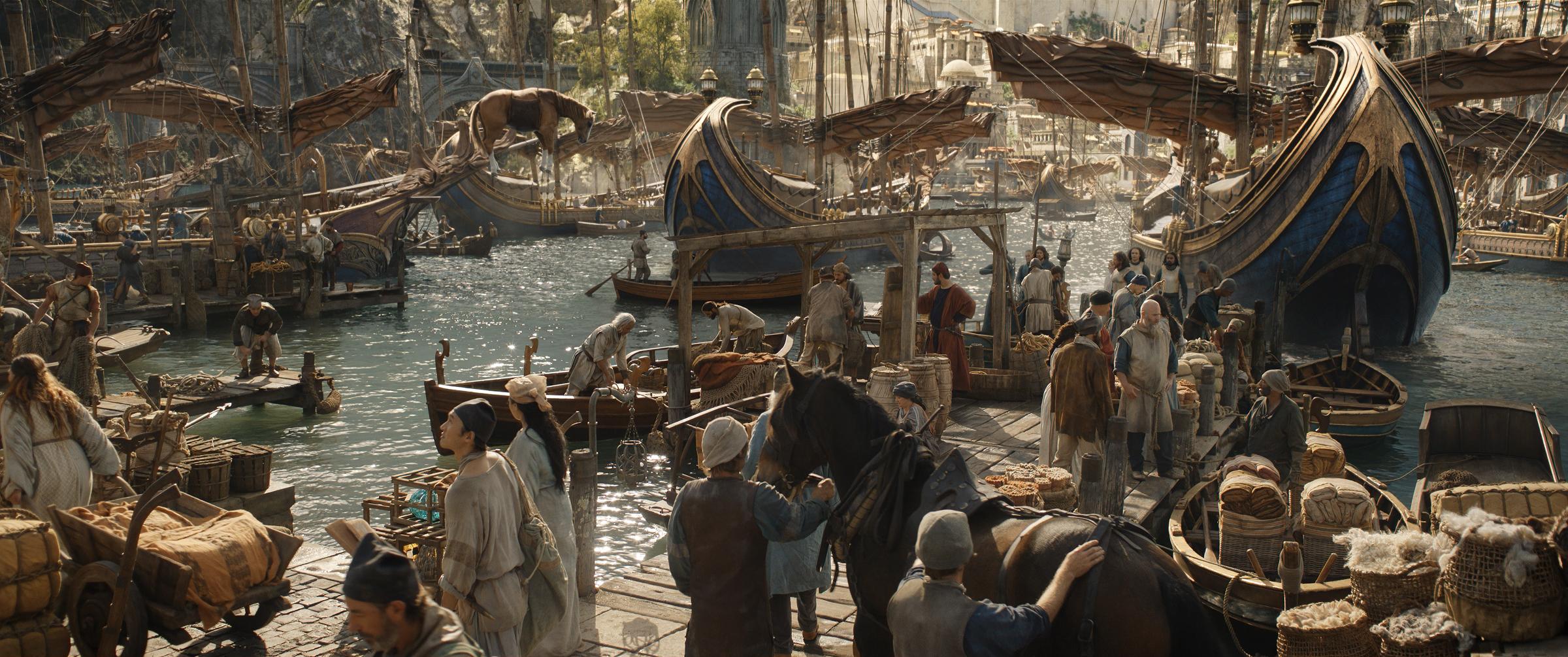
The sprawling series is set more than 3,000 years before the events of The Lord of the Rings. The show filmed its first season in New Zealand and built practical sets, including cities with water lapping against the docks. Audiences will visit Númenor, Tolkien’s version of Atlantis. They’ll see Khazad-dûm, an ancient subterranean kingdom where the dwarves dug for treasure. They’ll get a glimpse of the elvish realm of Lindon. And that’s just the start.
“A saner person would do the Númenor show,” says executive producer Lindsey Weber. “That would be enough for 50 hours. The Lindon show. That would be enough. But we have six or seven worlds. It’s one thing to write—a little flick of a pen on a page—another thing to make seven living, breathing places inhabited by people—and all fabulous and beautiful and all ready to shoot at the same time.”
Only 25% of the actors play humans
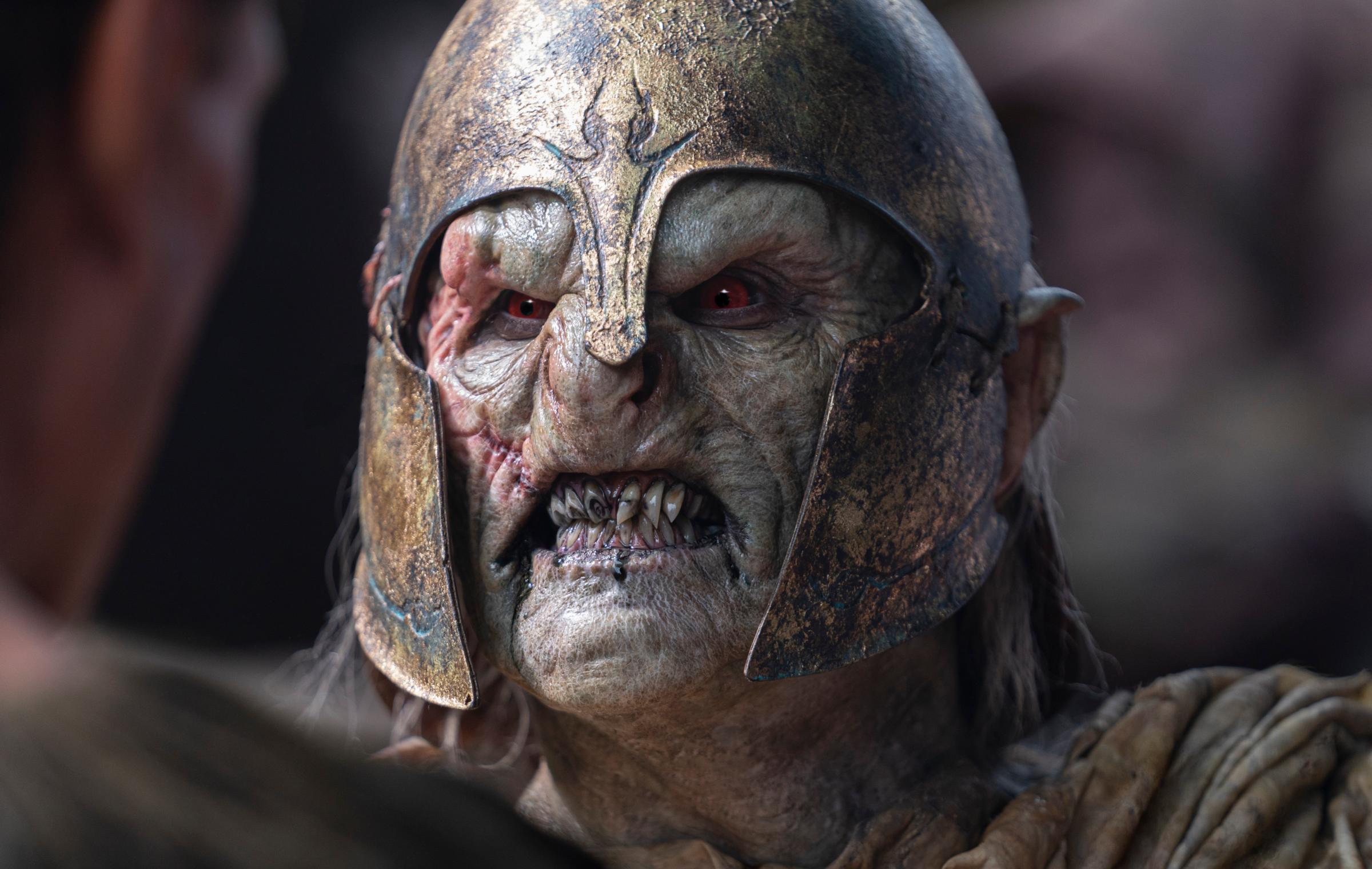
Only a quarter of the actors were cast as human characters. Nearly everyone else—orcs, elves, dwarves, harfoots—had to have prosthetics applied every day. The use of those prosthetics will come as some relief to fans who gushed over the practical effects in Peter Jackson’s Lord of the Rings film trilogy, and bemoaned his reliance on CGI in the Hobbit movies that followed.
The Rings of Power showrunners say that they are great admirers of Jackson’s films. McKay calls them “an insane achievement.” They tried to learn from what succeeded in those movies while simultaneously forging a separate identity for their own series. “We love the practical, physical creatures, especially in the first few films,” says McKay. “We wanted to do that because that really works.”
Read More: Exclusive: This Fan-Favorite Character Is Joining the Second Season of Rings of Power
The showrunners wrote different poetic meters for different peoples of Middle-earth
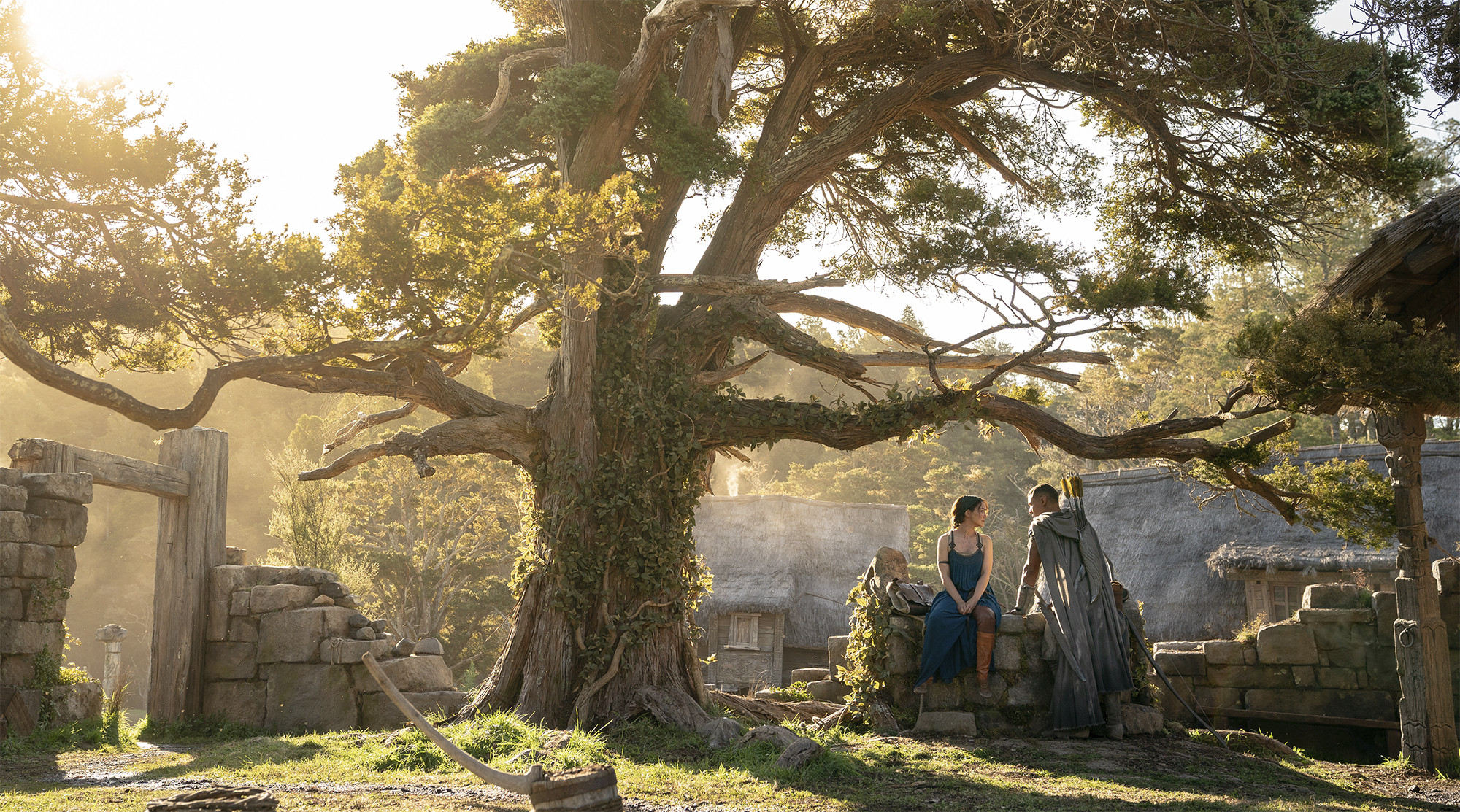
Tolkien was a philologist who was obsessed with not only language but poetry. Each of the different peoples of Middle-earth speak with a different vocabulary, formality, and even poetic meter.
In trying to capture Tolkien’s voice, the showrunners were careful to make sure elves spoke like elves, dwarves like dwarves, and so on. Luckily, Payne is a student of Tolkien’s language who sent his son’s birth announcement out in both English and Elvish. When I asked him about the challenges of writing dialogue, he responded, “I don’t need food or water. The work of doing that is food and water itself.”
Fortunately, many of the actors in the cast have Shakespearean backgrounds.
We know how the story ends. The showrunners saw that as an opportunity
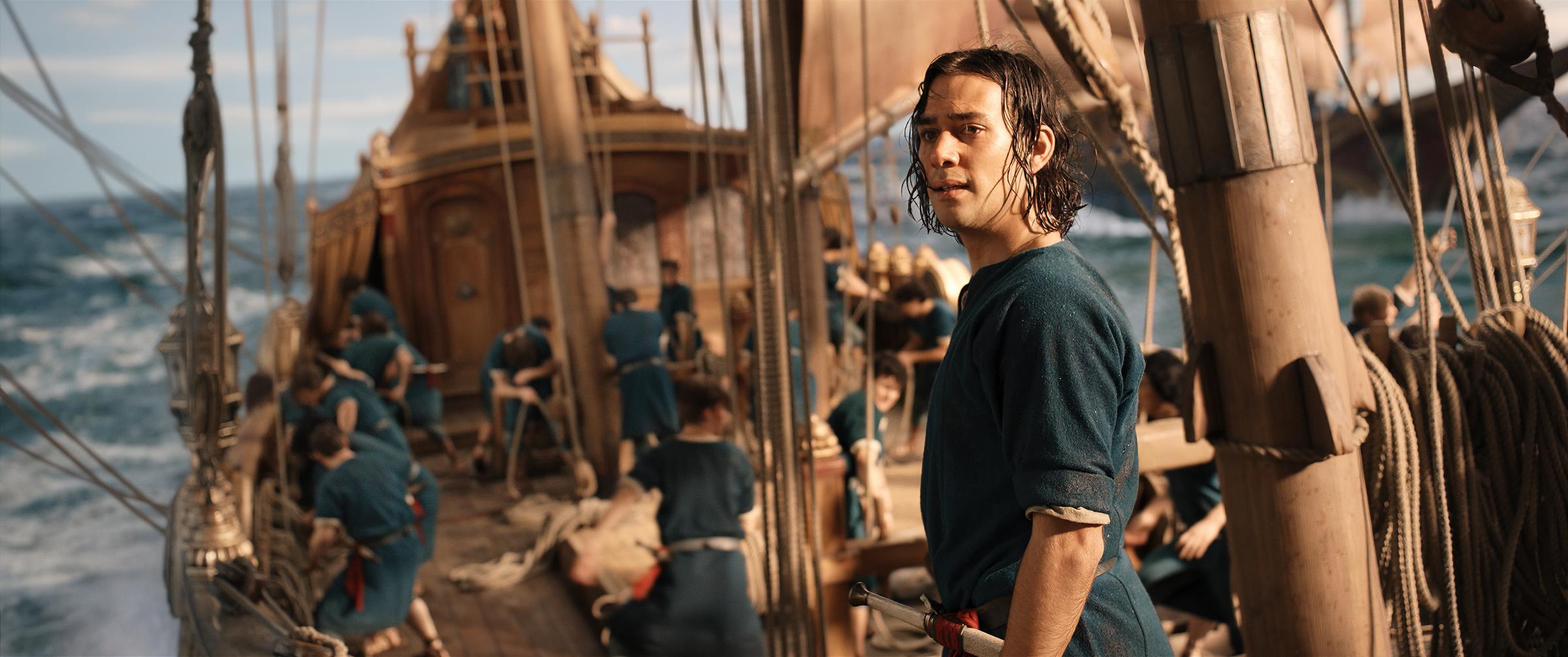
The problem with prequels is that the audience often knows where the story is headed. In this case, we know that an alliance of elves and men will battle Sauron. And we know a man named Isildur will manage to cut the one ring from Sauron’s hand but fail to destroy it.
“When you hear the story, you think, ‘Oh my gosh, what an idiot,'” says Payne. “This guy could have ended all this suffering but because of his pride, vanity, and greed, he didn’t.’ Knowing where that character is going, how do you make an audience fall in love with this character? See the trials he goes through? It feels inevitable and tragic, but you get why he did it.”
McKay agrees that stories with inevitable conclusions can still have stakes. He cites Titanic: The fact that the audience knows the boat is going to hit the iceberg gives the romance between Kate Winslet and Leonardo DiCaprio’s characters a layer of tragedy and tension.
The hardest scene to shoot didn’t involve trolls or sea monsters
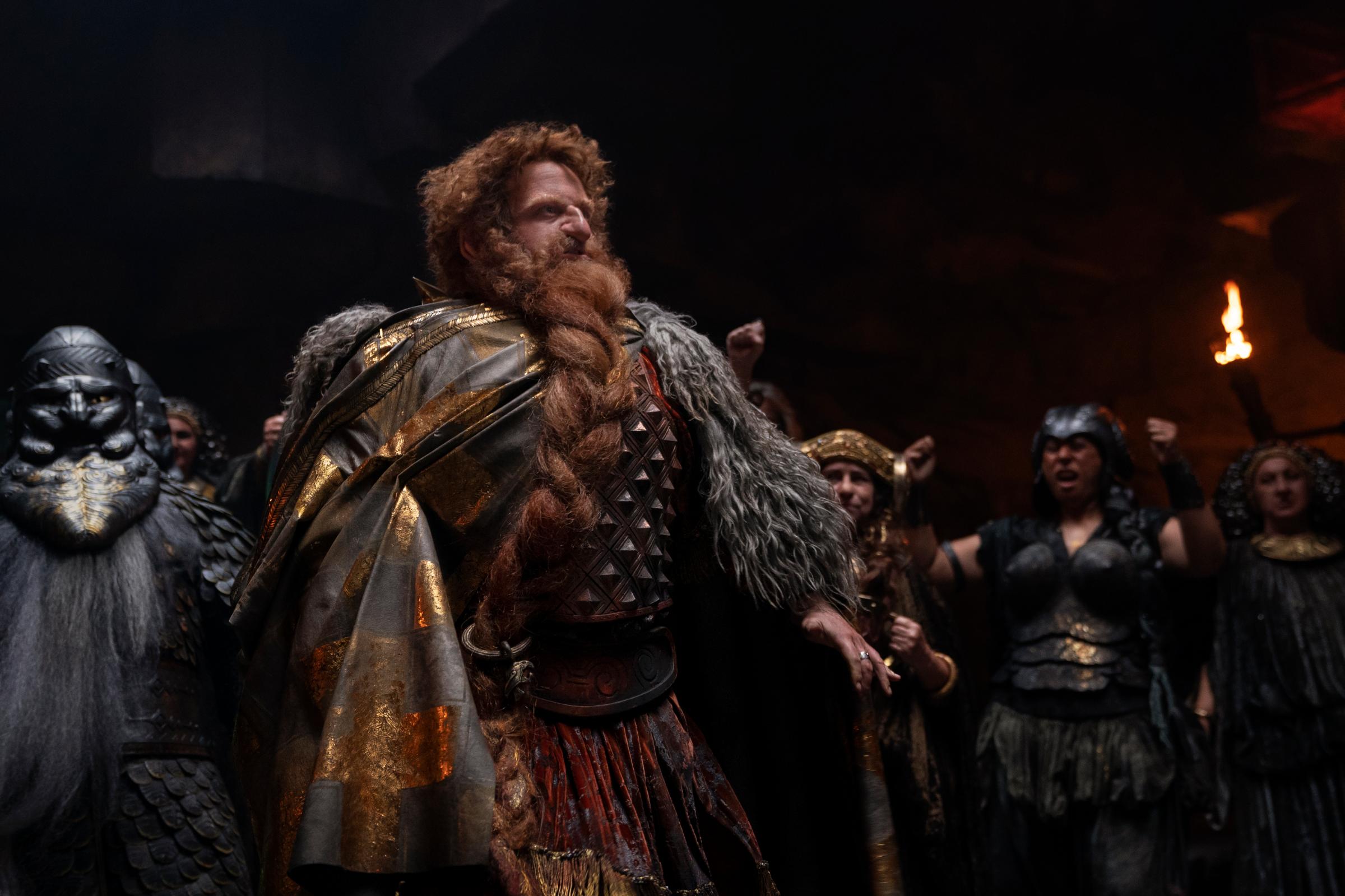
The most difficult scene, according to Weber, was one in which Elrond competes in a rock-breaking competition with the dwarf Prince Durin IV as Durin’s subjects look on. “It is probably the single most complex and technical thing we shot, which you wouldn’t think because it’s a bunch of guys walking around the room,” she says. “But most of them are meant to be one size and one is meant to be another, and that is a very complicated math problem.”
She adds: “As the actors decide to move and touch each other and pick things up and put things down, every single one of those movements requires a magic trick.”
Read More: The Lord of the Rings Movies Are Now Holiday Movies. Here’s Why
All of the actors had to go through “scale academy”
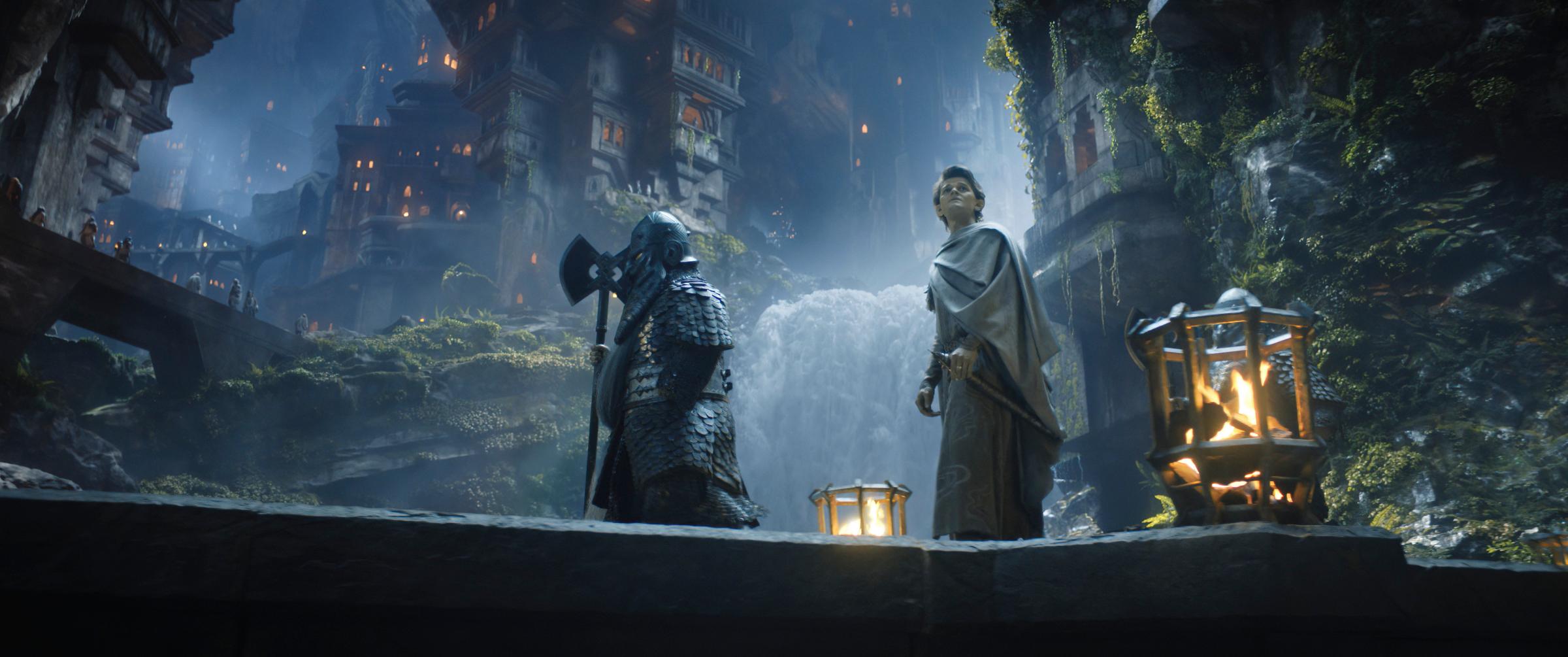
Each of the actors took a multi-hour course on all the tips and tricks used to make dwarves and harfoots look smaller than men and elves. Examples of such movie magic include oversized props, big hair and beards, and people wearing cardboard faces on top of their heads so their scene partners know where to look when delivering their lines.
The show employed “scale ambassadors” whose sole job it was to make sure everything was properly proportioned. “If a button on a jacket is the wrong size, it’s over,” says Weber.
The showrunners spoke extensively with the Tolkien estate
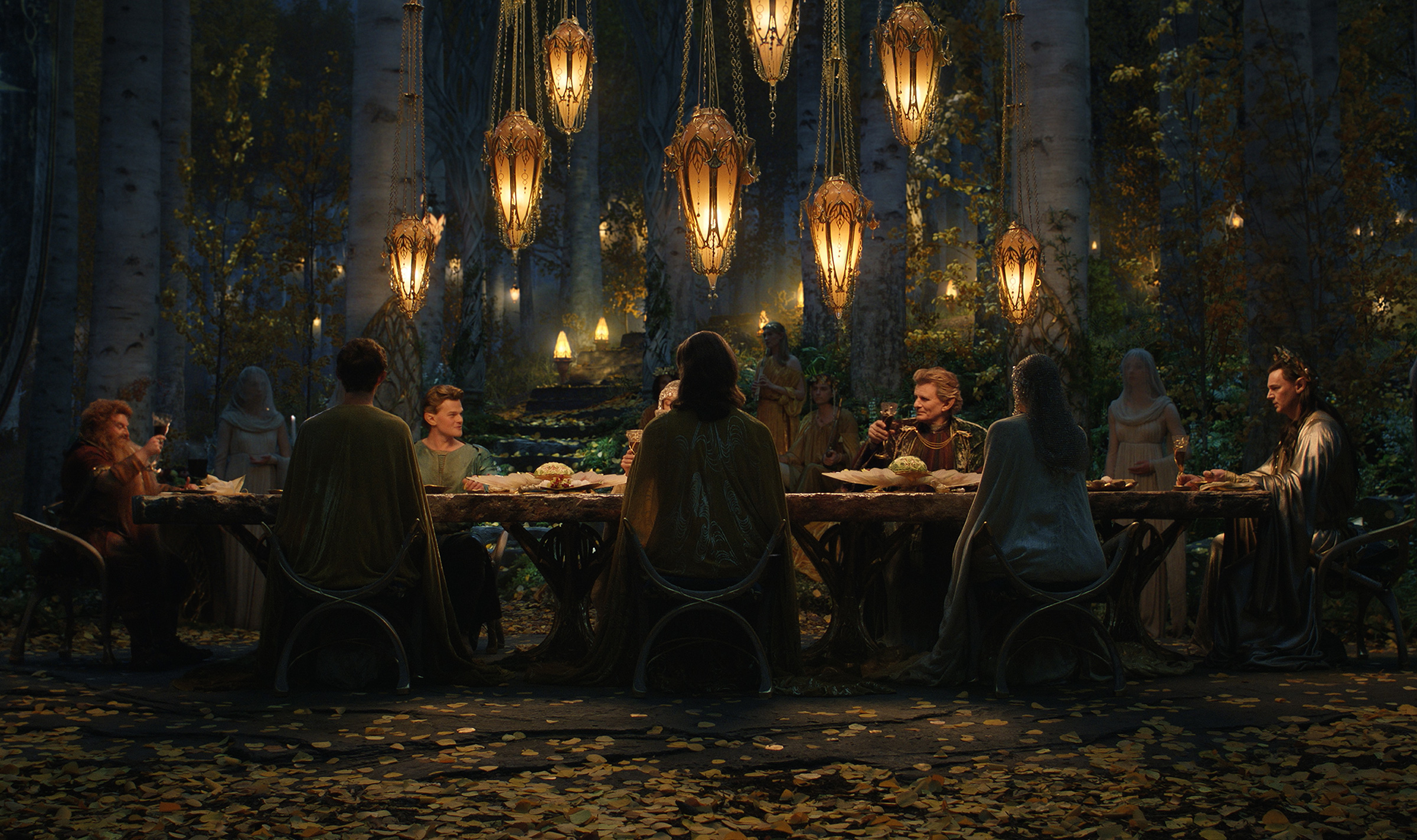
In particular, the creators consulted with J.R.R. Tolkien’s grandson, Simon Tolkien. “Meeting him was the experience of a lifetime,” says Payne. They stayed in touch with the Tolkien family and other members of the estate. “At key moments they would weigh in, and we would write letters back and forth and communicate and make sure we were doing something all of us could agree on to move forward with the story.”
Time compression was necessary
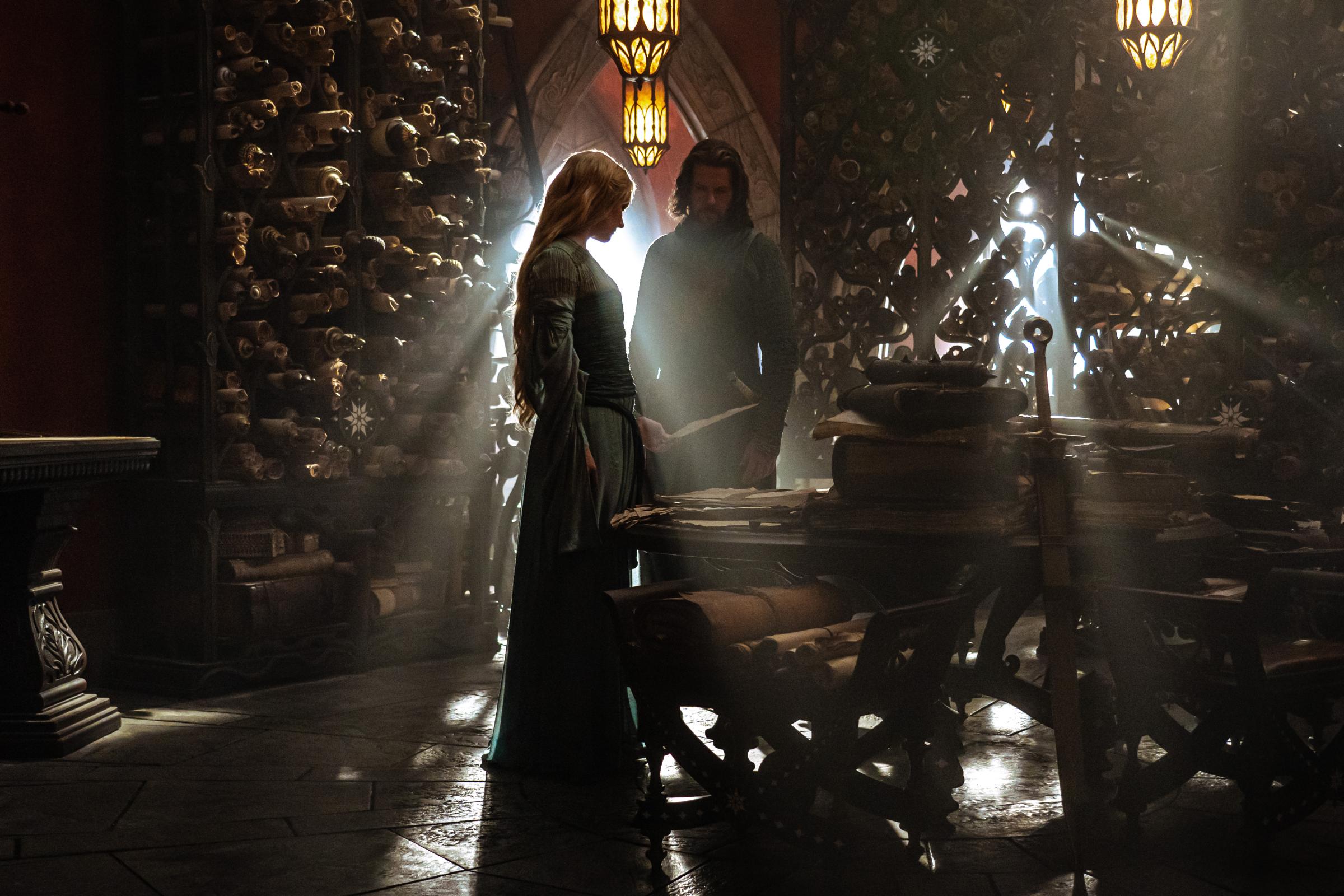
The appendices outline thousands of years worth of epic storytelling. Many of the elf characters, who are immortal, live through all the various trials and tribulations of Middle-earth in the Second Age, while the mortal men, well, die. Some fans have expressed concern because the show will be compressing these events to fit into a five-season series. McKay has a defense.
“These events were laid out in the timeline, and there’s hundreds of years between them. Tolkien wasn’t writing a story. He was writing a faux history,” he says. “But now it needs to move like a story. It needs to have breadth and depth. It needs to be emotional and have a continuity. That means you can’t stop for 200 years and have half your cast die every two episodes. It’s not practical or satisfying to the viewer.”
Read More: An Extremely Detailed Breakdown of the Rings of Power Trailer
J.R.R. Tolkien changed his mind about Galadriel a lot. Actor Morfydd Clark used that to her advantage
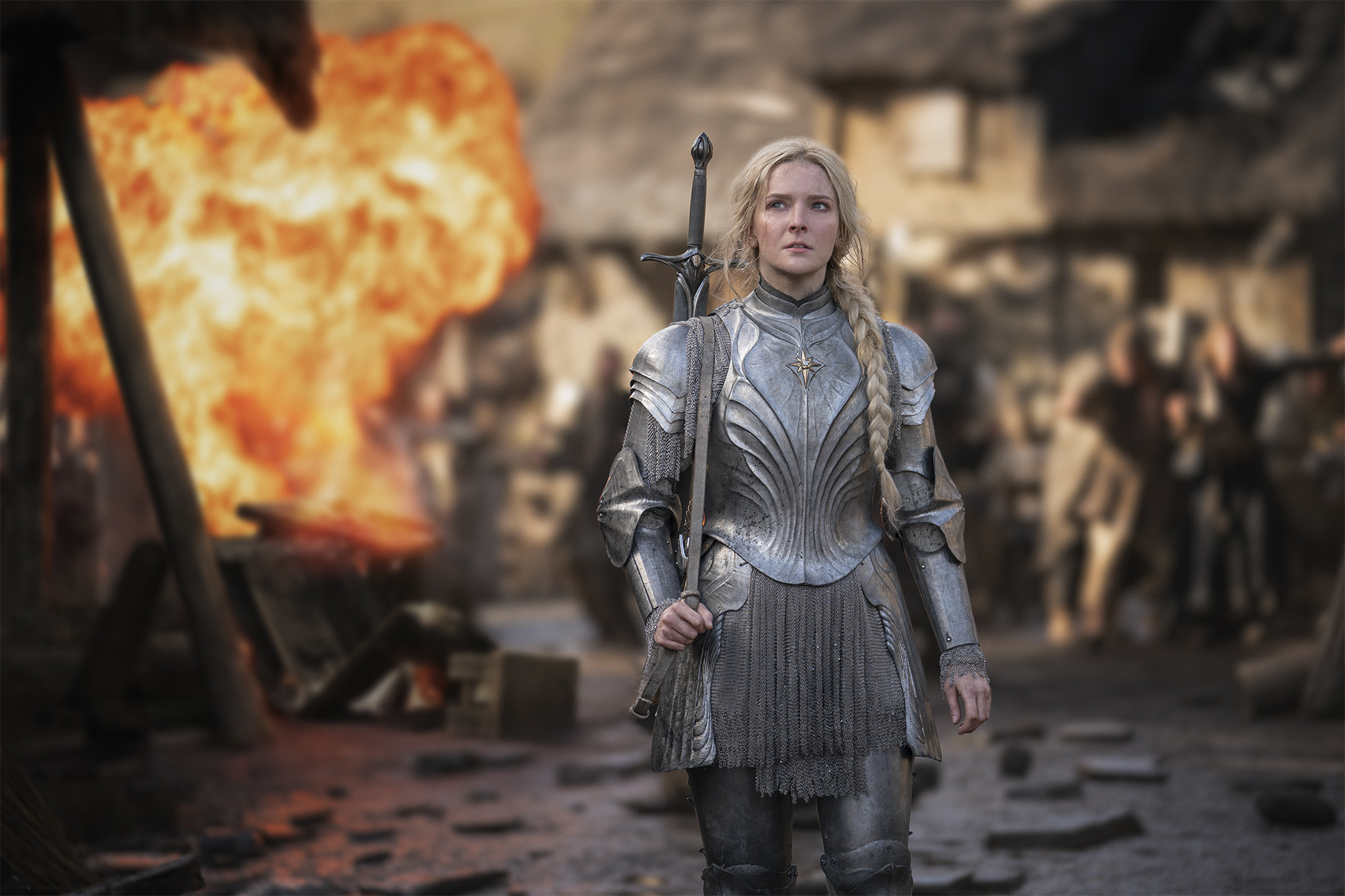
Even casual Lord of the Rings fans will recognize the name Galadriel. Like other elves, Galadriel is immortal and thus is alive in the Second Age when The Rings of Power is set. She’s also there in the Third Age during the events of The Lord of the Rings. Tolkien wrote extensively about Galadriel and her adventures over the years, revising the stories up until his death. Over the years he contradicted himself in outlining the details of her personality, when she got married, and how she spent the Second Age in his various notes.
The showrunners pulled from these different threads to flesh out the younger version of the character. Payne points out that Galadriel’s name roughly translates to “elf maiden with a crown of golden hair.” “That’s because when she would do sparring exercises and fight with a sword, she would do her hair up in braids on the top of her head,” he says. “So the idea of Galadriel as a warrior is built into Tolkien’s Legendarium. It’s just not something that we think of from the depictions that we’ve seen.”
Morfydd Clark took that to heart when performing as young Galadriel. “Tolkien changed his mind about her a lot,” she said. “You could debate her history until the cows come home. That was nice because there were quite a few structures of her I could pick from.”
The Galadriel of The Rings of Power is younger and different in temperament from the version fans have encountered onscreen in Peter Jackson’s films. In The Fellowship of the Ring, she’s an elder stateswoman, the serene elf in the woods. In that book, when Frodo offers her the ring, she is tempted to take it but ultimately knows that she would be corrupted by its power and rejects the gift. It makes for a memorable and frightening scene in Peter Jackson’s films.
The Galadriel in The Rings of Power is younger, more stubborn, and eager to avenge the death of her brother at the hands of Sauron. Clark is excited to explore what happens to the character in the intervening years such that she becomes wiser and more self-aware.
We can learn a lot from Tolkien’s vision of masculinity
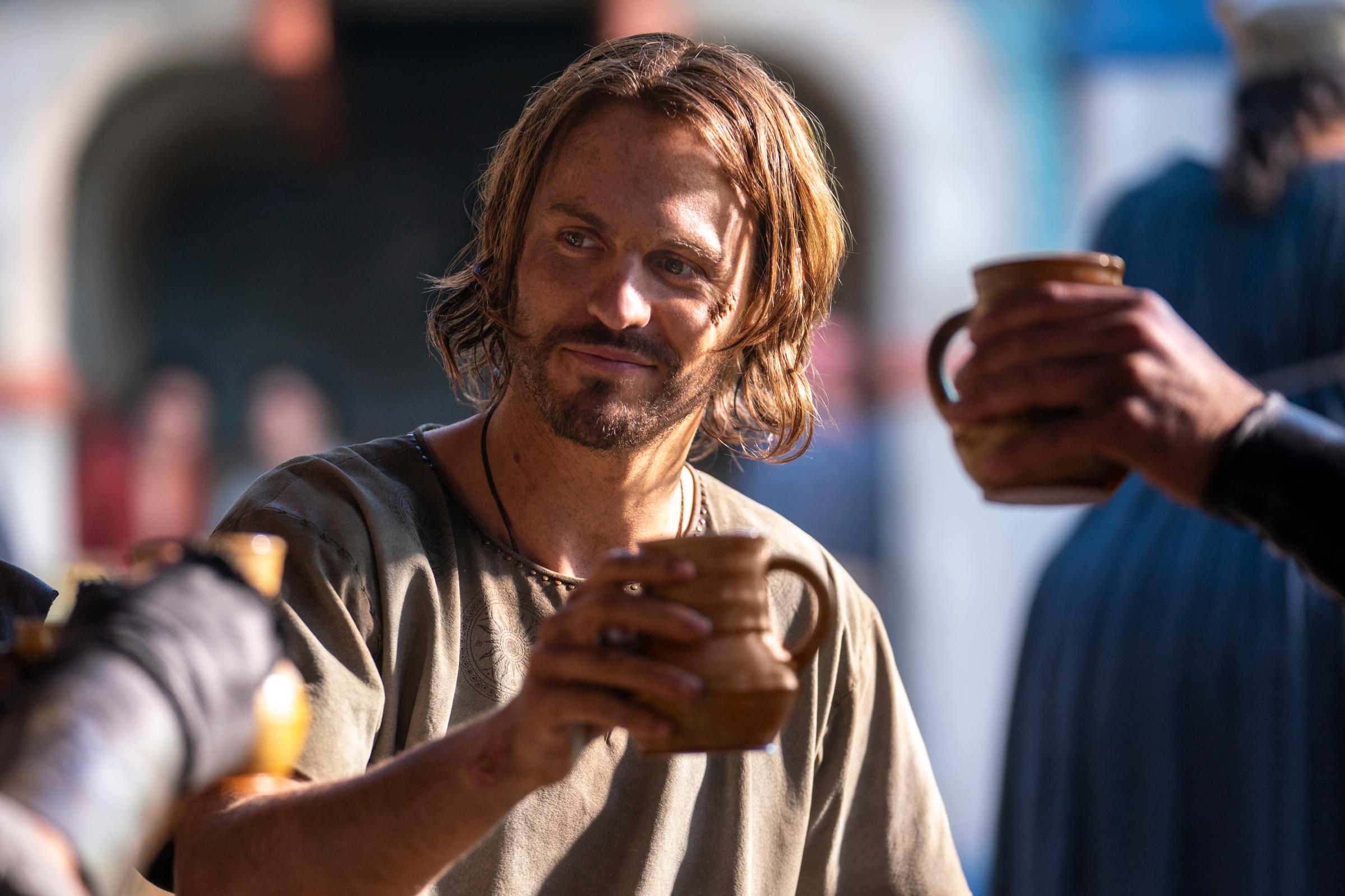
Yes, Aragorn was a fierce warrior who spent a lot of his time sleeping in dirt and slaying orcs. But he also helped Bilbo write songs. He kissed Boromir’s forehead as Boromir died. Tolkien’s men are sensitive and caring. It’s the love between Frodo and Sam that shepherds them into Mordor.
“There’s a gentleness to it, to the characters he wrote,” says Clark. “The way masculinity is viewed there’s showing of emotion, pride in friendship and gentleness. The kindness of the characters has staying power.”
Of his character, the elf Arondir, Ismael Cruz Córodova adds, “Elves have a lot of what we think of as feminine energy in their posture and sensibilities. And I was playing a warrior, which sent me to what we think of as masculine energy. We played with staying in an open space, and you can see that tug of war of what he’s meant to be as a solider versus what he’s allowed to feel.”
It sounds like some other male characters in The Rings of Power could have used more of the male bonding that benefited Aragorn. Charlie Vickers told me of his character Halbrand, “What happens when a man hasn’t been loved his whole life? I think often something like power fills that void.” Maybe keep an eye on Hal, folks.
More Must-Reads from TIME
- Caitlin Clark Is TIME's 2024 Athlete of the Year
- Where Trump 2.0 Will Differ From 1.0
- Is Intermittent Fasting Good or Bad for You?
- The 100 Must-Read Books of 2024
- Column: If Optimism Feels Ridiculous Now, Try Hope
- The Future of Climate Action Is Trade Policy
- FX’s Say Nothing Is the Must-Watch Political Thriller of 2024
- Merle Bombardieri Is Helping People Make the Baby Decision
Write to Eliana Dockterman at eliana.dockterman@time.com